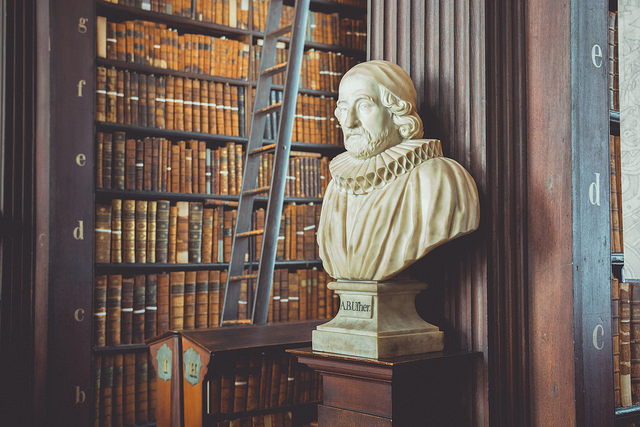College will commission four new sculptures of female scholars for the main chamber of the Old Library, a year after it first called on staff and students to submit nominations.
Trinity announced today that the scientist Rosalind Franklin, the folklorist, dramatist and theatre-founder Augusta Gregory, the mathematician Ada Lovelace and the writer and pioneering women’s rights advocate Mary Wollstonecraft have been chosen to be memorialised.
A panel, chaired by the Provost and including former registrars, the librarian as well as academic and collections experts, selected the four names – including two women from the sciences and two women from the arts and humanities – from a list of over 500 suggestions.
In a press statement, Provost Patrick Prendergast said: “The Long Room in the Old Library of Trinity College Dublin is one of the most magnificent rooms in the world, visited by hundreds of thousands of people most years.”
“I welcome this initiative as a step towards reflecting the university’s diversity in such a nationally significant location”, he added.
The current collection of busts on display consists solely of 40 male scholars, including Aristotle, William Shakespeare and Isaac Newton.
This is the first time in over a century that Trinity has commissioned new sculptures for the Old Library. No new sculptures have been commissioned since the 1880s and no additional sculptures have been installed since the 1920s.
Helen Shenton, College librarian and archivist said in a press statement that: “As the first woman Librarian in the College’s 428-year history, I am especially delighted to champion this initiative to address the historic inequity in the Long Room.”
College has said that funding for the commissions is being sought, but that the completion of the project will depend on this finance being available.
College also recognised that “women will still represent only 10% of the busts in the Long Room and that the existing subjects do not represent the ethnic and gender diversity that distinguishes the history of scholarship”.
It added that it “will welcome contributions and ideas about how best to reflect the full diversity of academic achievement”.
At the end of last year, Provost Patrick Prendergast invited nominations from Trinity students, staff and alumni for new sculpture busts.
Though many welcomed the move, the Journal revealed that a number of Trinity staff had objected to Prendergast’s phrasing of his proposal to make Trinity’s public spaces more reflective of the diversity of the College.
One staff member wrote: “Should we admit this is a gesture and we know including some or two isn’t exactly going to right the wrongs of history, but that it is that – history – and we are proposing to make a change for the present and the future generations?”
The absence of women in the collection was highlighted in 2014 by American journalist and social commentator Mona Eltahawy when she spoke to the University Philosophical Society (the Phil).
Internal emails seen by the Journal showed that College has been considering a commission for sculptures of women since February last year.







